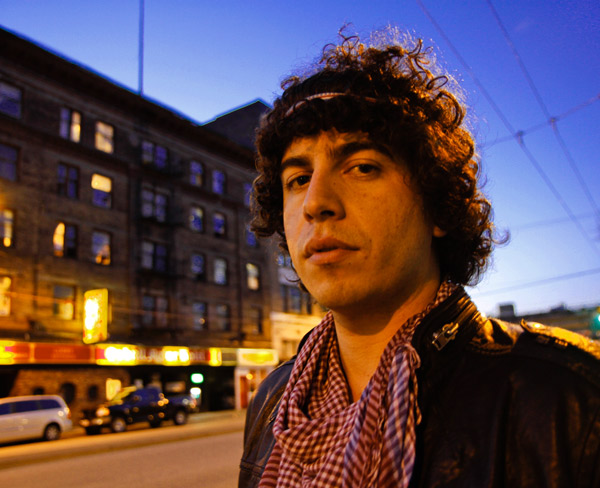Desert noir and Tex-Mex folk rock.
These are just a couple of the terms that have been bandied about by critics to describe the catalogue of young Mexican-American musician Brian Lopez.
Such genre-straddling labels may sound frivolous until you hear Lopez’s new album Ultra—a multi-layered tapestry of rock, country, pop and traditional folk songs written in English and Spanish.
As Lopez starts his set at Vancouver’s Electric Owl Social Club, his falsetto on opening track Montjuic is accompanied by an unusual combination of violin, cello, accordion and lap steel guitar.
Perhaps one of the hardest trials involved in becoming a musician is finding a sound. In the sound you make, you will explain where you’re coming from, where your heart is, and why the listener should care. After finding this one thread to be sewn throughout all your songs, you set yourself apart as a musician.
But, what is even harder is finding more than one sound, in fact, several sounds, and perfecting them all.
And yet Lopez seems to have accomplished just that.
“I think that travelling and playing for so many years in countries like Spain and Mexico has really broadened my mind and impacted my music,” says Lopez.
Lopez pauses for a second and adjusts the bandanna barely controlling his Playmobil-afro.
“I mean, as a result, my music is almost too eclectic,” he says. “It’s actually made it hard to market it.”
***
Hailing from the hot and dusty city of Tucson, the same town that gave us Calexico, it seems only fitting that Lopez’s album Ultra sounds like a Radiohead-inspired Western soundtrack.
Lopez says that Tucson has molded him into the musician he is today.
“Tucson plays a big part in the language of the album, as Spanish is a prominent language there—you hear it all the time walking down the street, almost as much as you hear English,” says Lopez.
“I’m a third generation Latino, so I didn’t grow up at home speaking Spanish but having the Spanish language on the album is still important as it’s who I am and where I come from,” he stresses. “And there’s a lot of people like me, who identify with their Mexican and American heritages equally.”
Recently, Arizona governor Jan Brewer attracted condemnation as she introduced legislation to ban Mexican-American studies in state schools.
“Tucson has been the birthplace of a number of really dumbass policies over the last couple of years,” admits Lopez. “The Mexican heritage is so engrained in Tucson that this one’ll be overturned for sure.
Lopez says that his lyrics are typically of love and relationships, but that ultimately it’s up to the individual listener to interpret the songs and make up their own story to accompany it.
He believes that music can transcend lingual and cultural barriers. More than lyrics, music is about a melody that will stay with the listener long after the show has ended.
But Lopez says Tucson and its lunar landscape has been his muse in other ways.
“Tucson is just such a damn hot place—I don’t think humans really belong there,” Lopez says laughing. “So staying indoors during the summertime is in your best interest, and if you’re writing and recording music, that’s even better.”
“It’s inspirational being out in the desert, it’s really just such an exotic and bizarre place,” says Lopez.
“You really just don’t realize it until you’ve lived away from it for a while and you come back, and you see those strangely shaped cacti, and you see the weird desert life and how wild it is.”
Lopez says Tucson is what separates him from the people who moved to New York or Los Angeles to pursue a music career.
“Tucson is what it is—nobody’s moving here to write the next big record,” says Lopez. “It’s an inspirational setting and we’re trying to keep that secret to ourselves.”
***
The band is just wrapping up their North American tour before they head to Europe for a summer tour.
It’s a welcome return for Lopez who lived in Spain for six years, touring Europe with artists like Calexico and Marianne Dissard.
And Lopez says he prefers playing abroad where musicians are better paid and more respected.
“In the U.S. we have a more disposable 15-minute culture where artists are big for the moment before we dispose of them,” says Lopez. “That’s just the way we do things and it’s just kind of sad.”
Lopez laments the fact that emerging artists like himself suffer in this environment.
“People can’t pay attention long enough, whereas people in Europe seem to have the patience—they understand and respect the musician,” he says. “You get people who sit and watch the show compared to in the U.S. where you’re having to play over people yelling at the bar.”
Lopez says that attitudes towards music seem to vary even from country to country.
“I was playing one show in Germany where the audience was so attentive—almost to the point where I felt awkward,” he says.
“I was playing and watching the crowd and it was just dead quiet,” Lopez recalls. “They just sat there with their hands in their laps and I remember thinking, ‘Damn man, they must really fucking hate this.’”
Lopez laughs.
“They weren’t even responding so I started trying to belt out these notes to get some sort of reaction and there was still nothing,” he recalls. “But then after the show everybody claps and then buys all your albums—it turns out that they loved it more than anything and they just respected your set.”
***
Lopez and his band members pack up after their set and shoehorn their gear into the small van outside the club—they’re headed back down to Portland to play a show the following day.
Lopez says there’s another positive to going on tour abroad this spring: the build-up to the U.S. election with the Republican primaries. For health purposes Lopez says he had to stop following the primaries on television.
“I’d been following it closely up until around October, all day long,” he says. “But then I left for Europe to tour for two months and I think my blood pressure went down.”
“When I got back it was like, ‘Oh, Newt Gingrich is the frontrunner in the primaries’—that was fucking crazy.”
But Lopez insists he’s not a political songwriter.
“Maybe when I’m old and cranky,” he jokes.
Marc Ellison is a photojournalist based in Vancouver, Canada. His work has appeared in Canadian Geographic, The Globe and Mail, The Toronto Star, MTV Canada, The Ottawa Citizen, The Vancouver Sun and The Vancouver Observer. He was awarded an IDRC Award for International Development Journalism in Spring 2011.
You can view his latest work – www.dwogpaco.com – which utilizes new digital media to highlight the reintegration issues facing female former child soldiers in northern Uganda.

